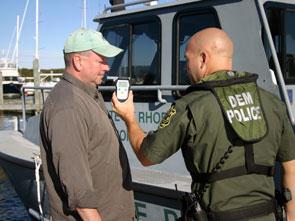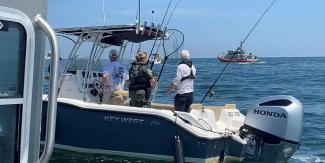Marine Unit

Protecting Rhode Island's Coastal Resources
Marine Officers play a critical role in safeguarding Rhode Island’s coastal and marine environments. They patrol state parks, shoreline areas, Narragansett Bay, and Rhode Island Sound by boat, patrol vehicle, all-terrain vehicle, and on foot. These officers enforce all state and federal marine fisheries regulations for finfish, lobster, and shellfish in both commercial and recreational sectors. They also enforce hunting regulations along coastal areas, ensure compliance with marine boating safety laws, investigate marine theft and boat accidents, and conduct search and rescue operations.
The Marine Unit is divided into two units: Marine East and Marine West. Led by a Lieutenant and a Sergeant, officers assigned to the Marine East unit cover territory from Greenwich Bay north and over to the East Bay, while Officers assigned to Marine West cover territory south of Greenwich Bay, including Jamestown.
They are responsible for patrolling the fishing ports along Rhode Island's coast, including the Port of Galilee in Point Judith, which is one of the largest ports in the Northeast. They also provide security for Marine Safety Zones as well as for emergency closures for fishing and shellfishing. Marine officers conduct state beach and coastal park patrols. They also teach boating safety courses, visit schools, and attend scout meetings, fairs, and events to promote boating safety and environmental conservation.
Additional Resources
- Boating Safety Certification
- DEM Boating/Licensing Office and Boat Registration
- Requirements and Standards for Boats and Associated Equipment
- Commercial Fishing Licensing
- Recreational Saltwater Fishing
- Marine Fisheries Minimum Sizes & Possession Limits
- Marine Pumpouts
- Shellfish Harvesting Approved and Closed Areas
- Marine Fisheries Regulations
- Other Fish and Wildlife Regulations
- DEM Division of Marine Fisheries
- Safe Harbor Policy
- RI Pilotage Commission
- RI Derelict and Abandoned Vessel and Obstruction Removal Commission
Recent Boating Safety Regulations
- All operators and passengers of canoes, kayaks, sailboards, kiteboards, paddleboards, and any other paddle craft must always wear a USCG-approved PFD while underway, regardless of age. Violations could result in a $100 ticket.
- To prevent injuries and save lives, prohibits anyone from riding on the bow of a powerboat unless it’s equipped with bow seats designed to accommodate passengers or from hanging their feet and legs over the top of the gunwale anywhere on the boat while underway.
- Boaters must slow down and move over when emergency vessels, such as Coast Guard, firefighting, harbormaster, and DEM boats, are within 300 feet of the boater and have their emergency lights activated.
- All fire extinguishers on boats must abide by their age expiration date.
- Captains of recreational boats 26 feet long or less equipped with an engine cut-off switch must use the switch if the vessel is “on plane or above displacement speed.” Displacement speed is the speed at which the wavelength of a vessel’s bow wave is equal to the waterline length of a vessel. As boat speed increases, the wavelength of the bow wave also increases.

